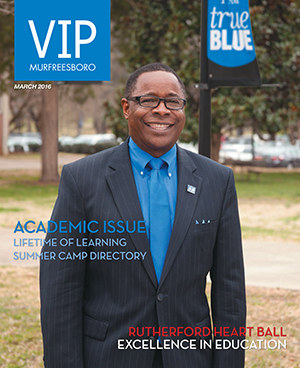VIProfile: Marty Clements
/Director Of Jackson-Madison County Emergency Management Agency
Story by Lyda Kay Ferree, The Southern Lifestyles Lady. Photography by Woody Woodard.
Marty Clements
Marty Clements has been Director of the Jackson-Madison County Emergency Management Agency (EMA) since 2005 starting with EMA as Deputy Director after the tornado of May 2003. He is a Certified Emergency Management Professional. He was one of twenty-five recipients of the Governor’s First Responder Awards for 2011 in honor of the 10th anniversary of 9/11.
He has overseen six Presidential Declarations including the 2008 tornado in Jackson and a major flooding event in 2010 for the entire state of Tennessee. He was part of a Law Enforcement Strike Team that responded to Lake Charles, Louisiana after the destruction caused by Hurricane Rita. Clements serves on State Committees for Childcare Safety and Mental Health Safety. He co-chairs the Regional Mental Health Safety and Childcare Safety Committees.
Clements is an instructor for law enforcement and civilians for Weapons of Mass Destruction, Incident Response to Terrorism and Suicide Bombing, WMD Radiological/Nuclear Awareness, NRA courses, TNBOE School Safety and many other Homeland Security/ FEMA courses. He was sent to Anchorage, Alaska to teach Logistics Section Chief for Homeland Security in 2001 for the Alaskan Shield Exercise. Also, he is a First Aid, CPR and AED AHA instructor and Hazardous Materials Technician and a School Safety Specialist for the Tennessee Board of Education. He started the West Tennessee Veterans Committee, which hosts an annual program and parade.
Clements holds a B.S. in Psychology from Union University and a Masters in Administration and Supervision from the University of Tennessee at Martin. He attended and played baseball for the University of Arkansas and Union University. He has taken continuing educational classes with over 2400 hours of Emergency Management training. He has 45 years of experience officiating at all levels of sports, calling over 500 contests and he has refereed the TSSAA State Championships Games in football, girls fast-pitch softball, volleyball, and two swimming championships. He has served as a Madison County Special Deputy for several years.
He is a former Rotarian serving on their board for several years, and he was awarded a Paul Harris Fellow from the Old Hickory Rotary Club. He serves on the board of the Tennessee Sports Foundation.
Currently Clements is an NRA instructor in Basic Pistol, Refuse to Be a Victim, Personal Protection in the Home, Personal Protection Outside the Home; a state certified concealed Carry and A.L.I.C.E. (Alert Lockdown Inform, Counter and Evacuate) Active Shooter Instructor, a Church Security Instructor and a Certified R.A.D. (Rape, Aggression and Defense) Instructor.
Clements is married to Wendy, and they have two sons. His hobbies include golf, fishing and hunting.
VIP: When was our Jackson-Madison Emergency Management Agency created and why?
Marty Clements: It was started in the 1950s as Civil Defense. In the 1980s it was changed from Civil Defense to Jackson-Madison County Emergency Management Agency, which was to help the military and local law enforcement in the homeland. We prepare and prevent, and we mitigate for any kind of military disaster.
VIP: What are the chief duties of your present job as Executive Director of the EMA?
MC: Mainly we manage all of the prevention and mitigation for natural and technology disasters. We work with all school health care departments and the public on developing emergency plans, and we coordinate any kind of disaster that comes our way. We work with all of the other first responder agencies for the year. We fill out a lot of paperwork after disasters, we work on grants, and we help to teach emergency planning at educational facilities and for the public, health care organizations and hospitals. We do a lot of training required for the Federal and local governments. We make sure that local law enforcement and fire departments are trained to go through the Federal government documentation. We are the lead agency for making sure that hazardous materials are cleaned up and cared for properly.
“The major thing to remember during a tornado warning is to be alert and to know exactly where the tornado is and when it is going to hit because you are not always at home. If you are traveling during a tornado, turn around and get away from the tornado and get in a low area. If you are at home and have a basement go there or to a safe room if you have one and make sure someone knows you have a safe room.”
VIP: Which months are included in the tornado season?
MC: Actually we have two major ones. One starts in March and goes through April and May, and the other one is in October/November/December. But we have tornadoes any time during the year in Jackson/Madison County.
VIP: Is Jackson located in what is known as “tornado alley”? If so, why?
MC: The National Weather Service and the media actually nicknamed us Dixie Alley for tornadoes. The National Weather Service watches, records and prepares permanent documents on tornadoes. Because of the number of tornadoes we have had in West Tennessee we have our own designation.
VIP: Do you communicate regularly with the National Weather Service of Memphis during tornadoes?
MC: We have National Weather Service Chat Rooms constantly. We have our 800 number on speed dial both ways. They call us and we call them.
VIP: How do we prepare for a tornado?
MC: The biggest thing is to be alert, to know exactly where the tornado is and when it is going to hit because you are not always at home when it hits. Most of our tornadoes here have been at night. Keep up with the weather if you are traveling. If you are into it, turn around and get away from it. You can’t outrun a tornado. Get in a low area. If you’re at home go to your basement or the most interior room and put on a helmet, and gather medical supplies and a flashlight. If you have a safe room, make sure that someone knows you have a safe room. There are forms you may pick up at local fire departments or EMA to fill out to give to them and Central Dispatch so if something happens in that area family members and neighbors will come searching for you.
Purchase a Weather Alert Radio at Walmart or Kroger. Anyone at my office at the EOC Building Jackson Emergency Operations (off Grady Montgomery Drive across from the main airport terminal) will program your weather radio for you.
VIP: Describe the contents of an emergency kit.
MC: You may buy commercial emergency kits. You don’t have to spend much money. The basics include a helmet or a hard hat or commercial hard hat (bicycle helmets work fine); some good working leather work gloves to keep you from getting splinters. If you have to walk somewhere you will need a flashlight, high visible vest, a crowbar, a back pack for insurance papers and medications, a medical kit, good shoes with steel shanks in them so you don’t step on nails or debris, a whistle so people can hear it for escape and for helping people. Put snacks in your car and safe room for children and/or pets and things to keep them from getting scared or nervous. You need an individual or personalized emergency kit, but always have a few extra things in there like cash, insurance papers, and a contact list with phone numbers of who to call if you get out and your house is destroyed and the phones are down.
VIP: What is the best place to go during a tornado?
MC: Several structures and businesses downtown have basements. When we really know a tornado is coming, make preparations early in the day. A lot of churches and businesses have basements. Work with them and suggest that they open their buildings.
VIP: Are all Jackson-Madison County sirens working now? How often are the sirens tested?
MC: Yes. There are 47 sirens in the city and county and all but three, which are being repaired, are working at present. Our sirens are tested twice a month at noon on Wednesdays. The test only lasts a few minutes.
VIP: What past professional experiences, if any, have prepared you for the EMA job?
MC: I have a masters in Administrative Supervision and I have been a teacher and Assistant Principal at Beech Bluff. Much of my job involves being a teacher with EMA. I am a response instructor for Weapons of Mass Destruction. I am a handgun instructor, concealed carry. I teach CPR/First Aid, and I teach personal self-defense. I have over 2400 hours of training for emergency management. I teach church security. Churches must have emergency plans, which cover tornadoes, fire and active shooters. I’m holding workshops to get churches to develop an emergency plan, especially for medical and natural disasters.
On April 21 at 9:00 am I am teaching an emergency planning session for churches. The cost is $12, which covers materials. If interested, please call me at 427-1271 for more information.
VIP: Tell me about your personal life.
MC: My wife, Wendy, is branch manager for Leaders Credit Union. Our oldest son lives in Franklin, TN, and our youngest son resides in Denver. We have a camper and we travel. I’m a big game hunter hunting for elk, moose and deer. I like to fish and play golf.
What To Know
Emergency Management Agency
Emergency Operations Center Building located at 239 Grady Montgomery Drive, across from the main airport terminal.
731-427-1271

















































